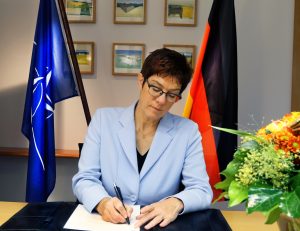Speaking virtually at an event organized by the Australian Strategic Policy Institute (ASPI) and the Konrad Adenauer Foundation (KAF) on November 5, German Minister of Defense Annegret Kramp-Karrenbauer once again reaffirmed her country’s desire to play a larger role in the Indo-Pacific. While Kramp-Karrenbauer maintained that Germany’s Indo-Pacific push is not directed at anybody, her emphasis on the need to protect territorial sovereignty around the world – including in the Indo-Pacific – as well as her assertion that “freedom of navigation [in the Indo-Pacific] is under threat” cleared reflects Germany’s growing anxiety about China’s assertive behavior in the region and globally.
Interestingly, Kramp-Karrenbauer positioned her country’s strategic challenge in triangular terms, situating it alongside the growing China-U.S. strategic competition, and noting that Germany simultaneously maintains a strong economic relationship with China while enjoying a “values-based” partnership with the United States. Also notable was her normative, although implicit, equation of Russia’s actions in Crimea in 2014 with “similar developments elsewhere,” in the Indo-Pacific – a veiled reference to Chinese maritime aggression in the South China Sea. The United States under the Trump administration has long and explicitly clubbed Russian and Chinese behavior together as examples of revisionism.
Australian Defense Minister Linda Reynolds also spoke at the event, which seemed to front-and-center Germany’s new Policy Guidelines for the Indo-Pacific Region issued in September. Reynolds welcomed Germany’s increasing interest in the Indo-Pacific, noting that “geographical distance is a historical mindset.”
Kramp-Karrenbauer’s very visible enthusiasm about working with U.S. ally Australia is a natural corollary of her beliefs that the United States remains indispensable as a security partner of Europe and Europe’s prosperity, in term, depends on a rules-based international order in the Indo-Pacific.
Writing in Politico Europe on the eve of the U.S. presidential elections, she bluntly stated: “Illusions of European strategic autonomy must come to an end: Europeans will not be able to replace America’s crucial role as a security provider.” “We have to acknowledge that, for the foreseeable future, we will remain dependent” on the United States, Kramp-Karrenbauer had written, albeit going on to add that Europe must do more, as a “giver” and not simply as a “taker.”
“… we must also realize that we need to spend and do a lot more to keep the peace, defend liberty, strengthen our values and reinforce the rules that we believe should be in force around the globe,” she had written.
This will be music to the ears of whoever eventually occupies the White House come January. Commenting on the U.S. elections on November 3, Kramp-Karrenbauer noted that independent of the outcome of the election – which she described as “very exciting” – issues around burden-sharing in NATO will persist.
Without framing it as, similar themes cropped up at her ASPI-KAF remarks today. Kramp-Karrenbauer noted the need for international networks to uphold the rules-based order in the Indo-Pacific. She added that both the European Union as well as NATO must play a larger role in the region. Interestingly, Kramp-Karrenbauer mentioned that the ongoing NATO review process includes deliberations around ways in which that security grouping could partner with like-minded countries in the Indo-Pacific – something, if it were to eventuate, will robustly contribute to regional security and send a sharp strategic signal to China. Kramp-Karrenbauer also mentioned that Germany is looking to send military liaison officers to interface with regional partners’ forces.
In an interview to the Sydney Morning Herald on November 2, Kramp-Karrenbauer had committed to deploying a German frigate to patrol the Indo-Pacific from next year. She had also revealed that discussions are underway with Australia about “the embarkation of German officers on Australian Navy units.”

































